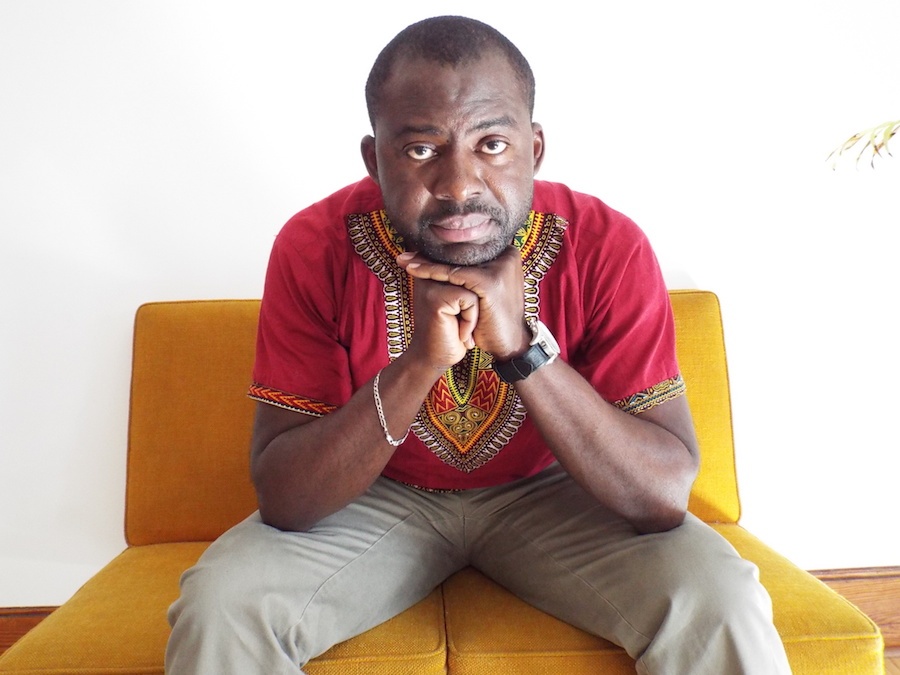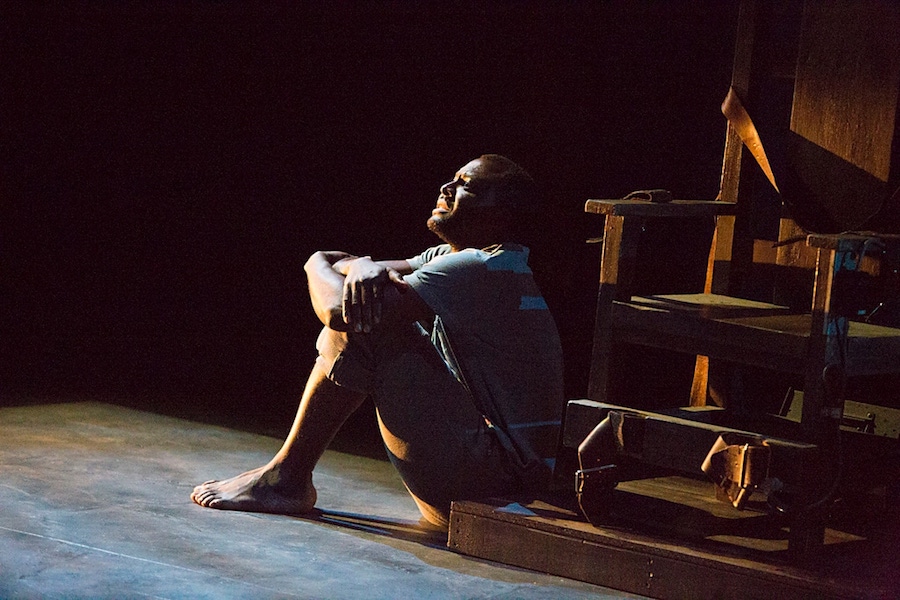
Toto Kisaku. Rays Kisaku Photo.
Toto Kisaku’s body is a straight line from his left toe to his second finger, steady and raised skyward. His arm has transformed into an instrument of terror. A gun has just been pressed to his temple, and then pushed away from his face. He thinks, for the first time in a week, that he may survive this. He may.
It’s one of the first scenes from the world premiere of Toto Kisaku’s Requiem for an Electric Chair, coming to the International Festival of Arts & Ideas for three performances this Friday and Saturday. A months-long piece that has evolved in New Haven, it is the playwright’s first piece in English, with he and a colleague translating it from French between fall 2017 and spring 2018.
The work runs Friday at 6 p.m. and Saturday at 1 p.m. and 6 p.m. at the Iseman Theatre. Tickets and more information here.
Written by Congolese playwright and director, New Havener, and recent asylum grantee Kisaku and co-directed by Hanifa Washington and Will MacAdams, Requiem tells the story of Kisaku’s abduction and near-death experiences at the hands of Congolese forces in December 2015.
The work effectively begins in two places: an interview for political asylum with U.S. Citizenship and Immigration Officials, and on a road in Kinshasa, Congo, where Kisaku was abducted and placed in a squalid holding cell for alleged crimes against the state. Around him on the stage, the audience is faced with six listless “friends” in various positions, Kisaku striking as he searches for what remains of each of them.
But the playwright’s story goes back much further, to Congo’s capital city Kinshasa almost two decades ago. An actor, playwright, set designer, and director, Kisaku studied drama at the National Institute for the Arts in Kinshasa. Among his works are Basal'ya Bazoba, Rencontres au Pluriel, Surface 1 et 2, 20 ans, et alors! and Mort d’Oluwemi d’Ajumako.
.jpg)
Judy Sirota Rosenthal Photo.
Since 2002, he has participated in workshops and residencies around the world with a particular emphasis on involving young people and marginalized communities in his work. In 2003 he founded his K-Mu Theater—for Kinois in Mutation, after the nickname for Kinshasa residents. In 2010, he went on to win the “Freedom to Create Award” in Cairo, Egypt.
His commitment to free expression, ultimately, is what brought him to blows with militarized and repressive Congolese government. In Basal'ya Bazoba (which translates to "Stupid Workers"), Kisaku draws attention to the plight of street children in Kinshasa.
At the time he developed the work in 2009, an estimated 20,000 children were homeless on the streets of Kinshasa, most of them expelled from their homes under accusations of witchcraft. They were subject to abuse and hunted to death; a law passed to protect them went unenforced.
“With my own work, the first thing I'm going to do is go the community, all of the community,” he said. “I'm going inside so I get the feeling of that community—the movement, the action, the talk.”
That was true of Basal'ya Bazoba. Kisaku's K-Mu Theatre offered theatre classes to street children and produced a show that was seen by an estimated 150,000 people.
“My work is about the four walls. I like to pick something that is inside of something to bring that outside," Kisaku said.
He added that those “four walls” may be a real space, like a prison cell, or a metaphorical space, such as the mind. In Recontre Au Pluriel (Meetings in Plural), Kisaku addressed his own life and struggles in Kinshasa.
“I consider the four walls as also inside of us, inside the body. I tried to take away all I have inside of me so people could identify [with his] tragedy,” he said. “My story is also my city's story so when I talk about bad things happening in airports and the administration, the government doesn't like that.”

Judy Sirota Rosenthal Photo.
Basal'ya Bazoba attracted the attention of the Congolese government, which was unsettled by the work's effectiveness at spurring calls for change. Performances of Recontre Au Pluriel—first staged in 2008 and performed until Kisaku left the country—were plagued by cancellations and the ongoing threatening presence of members of the secret police. Kisaku was arrested in December 2015 when he went to a university to perform Recontre Au Pluriel. The invite was a set-up. Police first demanded that he sign papers, then pulled him from a car when he unhooked his seatbelt. He lost consciousness when they pulled him from the car, and woke up in a Congolese prison.
For seven days, Kisaku was enclosed within four walls with other detainees. He was tortured, awaiting his own execution in a dark cell while watching other being led out to theirs. On the day of his scheduled killing, Kisaku was marched out to the woods. He watched as three others were killed in front of him.
But by the executioner's caprice—“I cannot kill you because I know you”—Kisaku was spared.
Now, Requiem for an Electric Chair is a work of catharsis and witness, a way of both processing his own trauma and alerting the world to the suffering of others. After workshopping parts of the play during City-Wide Open Studios last October, he has been collaborating closely with Washington and a New Haven based crew of artists, lighting and sound designers, and dramaturgs to bring it to the stage this month.
“We are living in the world and people are talking about it being global but it's not really true,” Kisaku said. “People have an ignorance of many things happening behind that wall.”
Things like the price exacted from the people of the Congo by the pillaging of the country's rich resources. These include “conflict minerals” such as coltan, which are used in the manufacture of consumer electronics like smartphones and computers. In the service of multinational corporations, the government stokes ethnic conflict in order to keep people divided and open to exploitation.
“We hear about executions, about the electric chair,” he said. “A thousand, a billion people hear about that but have never experienced it. But I am one of the people who has experienced execution. I know what happened to those people before they died.”
“I know which confession I did to my friends, my mother, my kids before I was supposed to die,” he continued. “I know what happened inside of this [cell]. It was like I was already dead.”
In Requiem for an Electric Chair, Kisaku winds around a wood-and-wire chair, sitting in it before recoiling from its zap. He waxes on its qualities, asks the audience if they too see how much it is like a throne. He arranges and rearranges bodies feverishly like chess pieces, growing desperate as the days pass. He poses the question, "Who brought us here?"
“Symbolically, I know a lot of people in the government who brought us here,” he said. “We don't know what time we arrived, don't know what day it is. We don't know anything inside,” he said. “But we know there's one's hands somewhere who would decide the Congolese situation.”
“The problem is, they are telling us to shut up,” he added. “But because it's theater, we could not shut up. Because it's art, we could not close our mouths. We are supposed to tell what happened and why we became the enemy of the maestro and also the invisible hand.”
Toto Kisaku’s Requiem for An Electric Chair runs June 22-23 at the Iseman Theatre on Chapel Street. For tickets and more information, click here. Lucy Gellman contributed reporting.